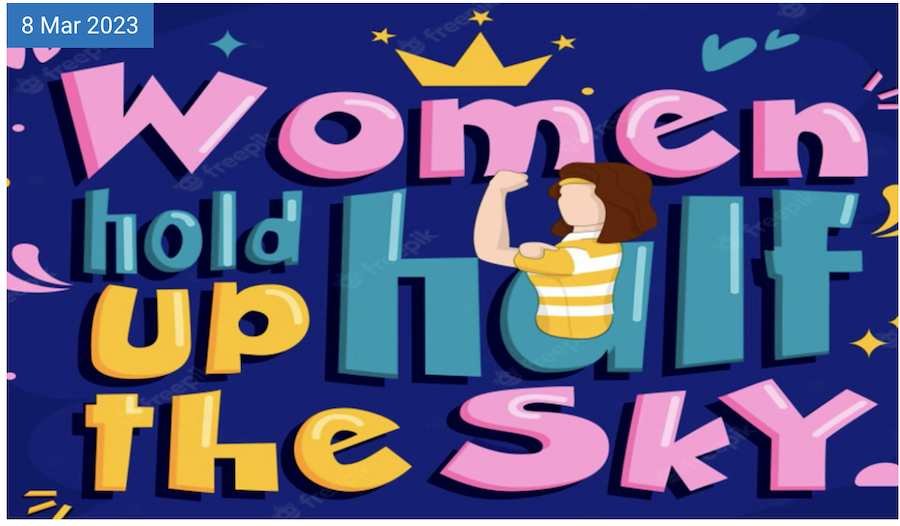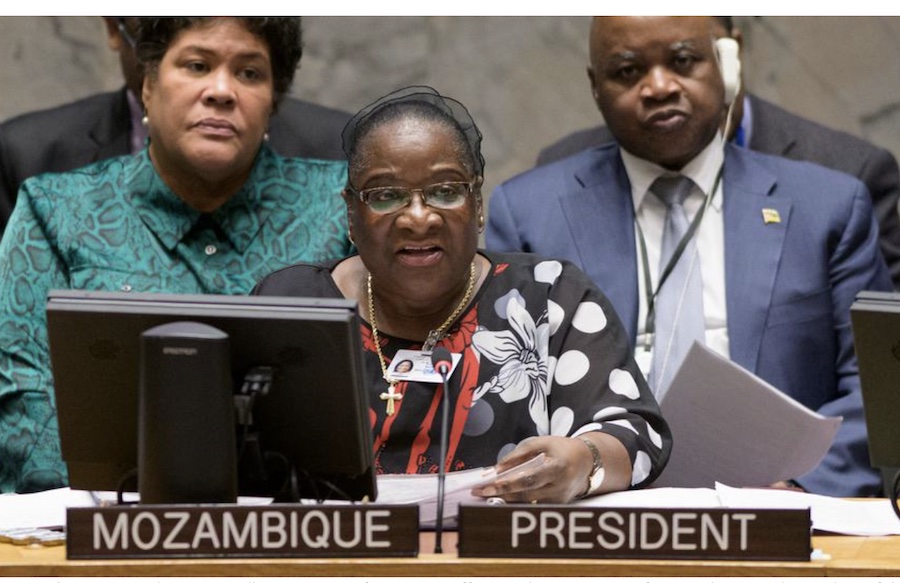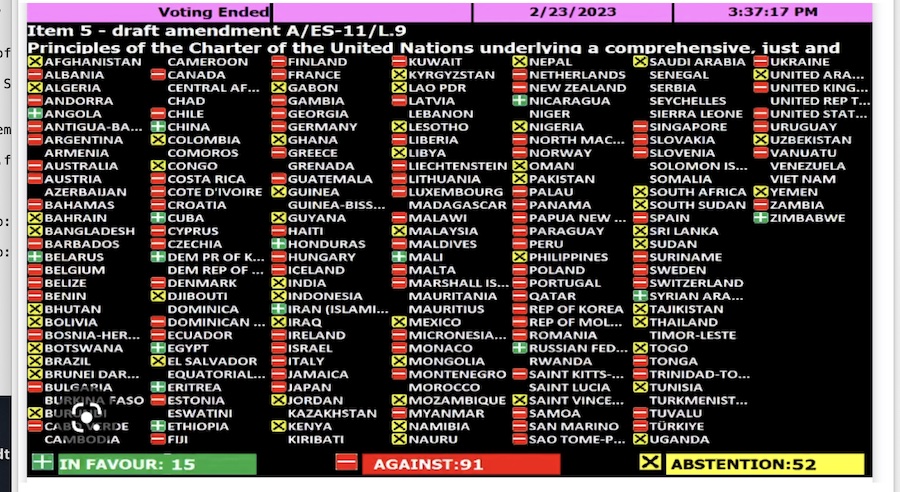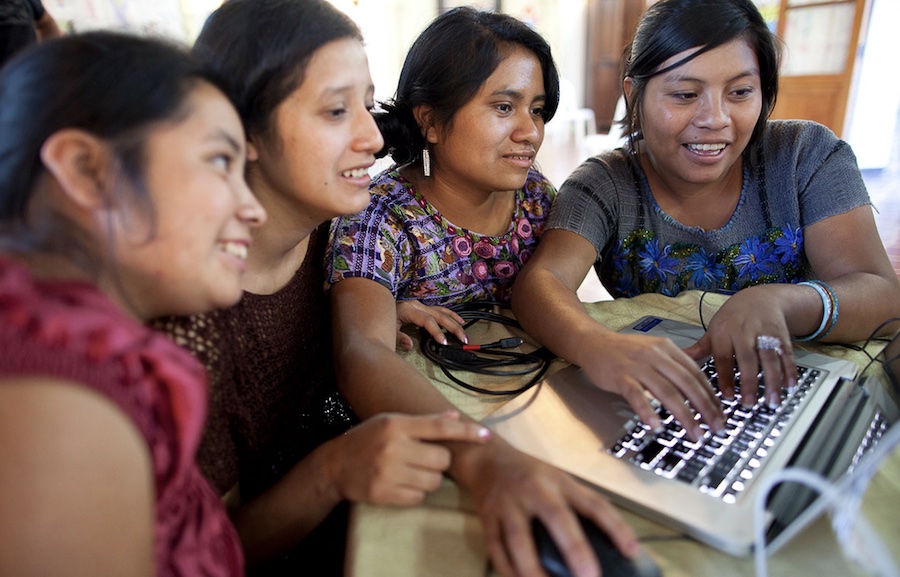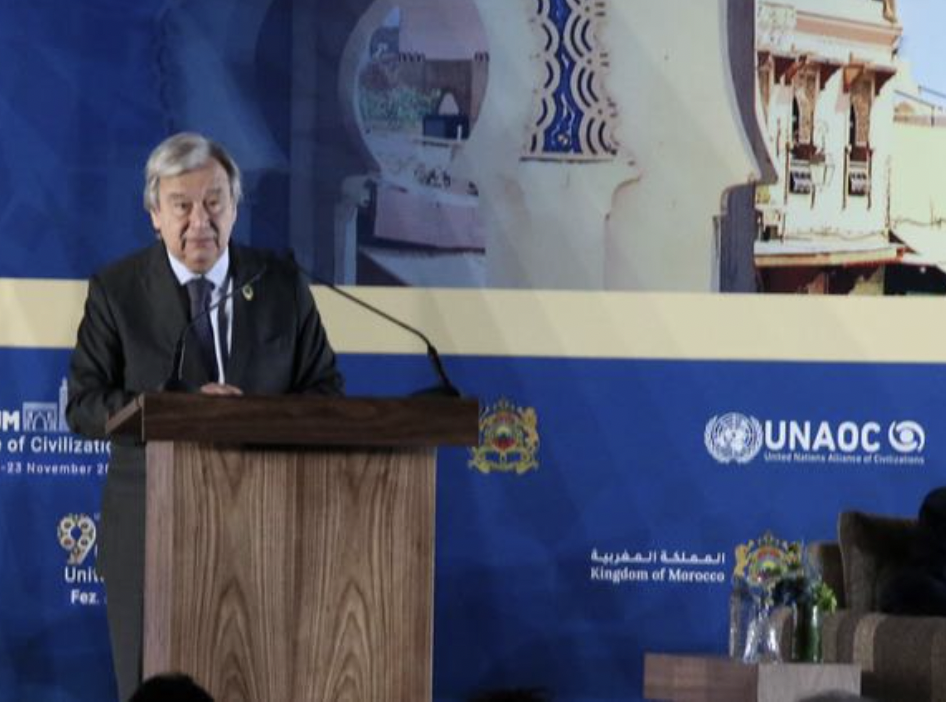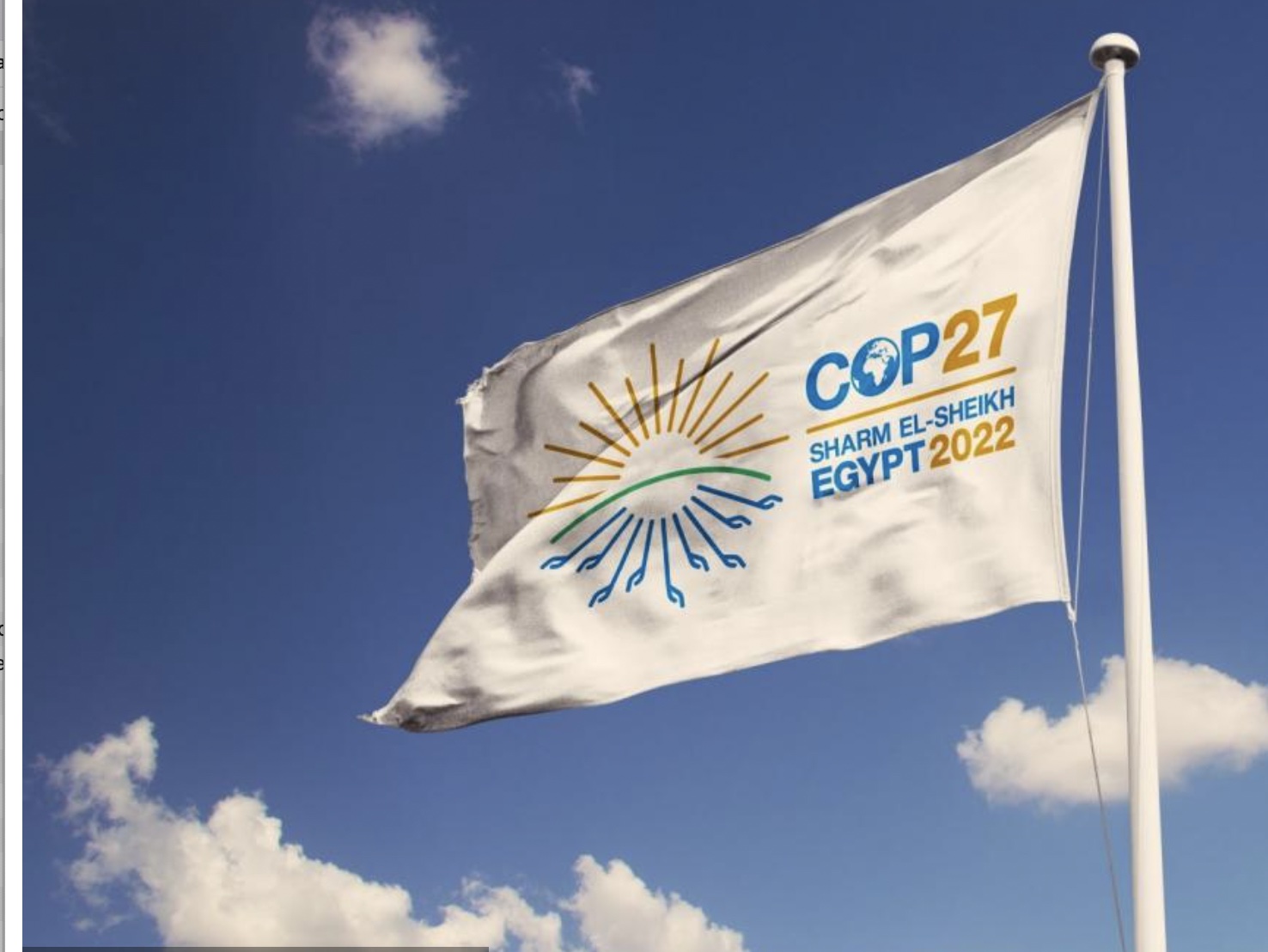. . WOMEN’S EQUALITY . .
Opening statement to the Commission on the Status of Women at its 67th session, by Ms. Sima Bahous, UN Under-Secretary-General and Executive Director of UN Women
A new kind of poverty now confronts the world, one that excludes women and girls in devastating ways—that of digital poverty.
The digital divide has become the new face of gender inequality, which is being compounded by the pushback against women and girls that we see in the world today.
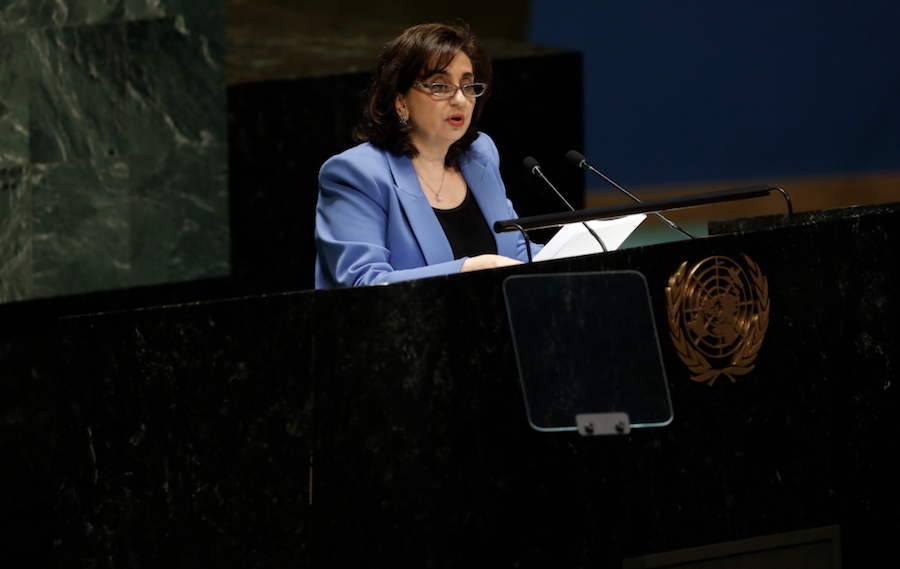
Ms. Sima Bahous, UN Under-Secretary-General and Executive Director of UN Women, delivers her opening statement to the 67th Session of the Commission on the Status of Women in the General Assembly Hall at United Nations Headquarters in New York, 6 March 2023. Photo: UN Women/Ryan Brown
That is why the work of this 67th Commission on the Status of Women (CSW) could not be more timely nor more critical.
We meet to do what this Commission does best: develop norms and standards for an urgent issue of significant importance that offers both opportunity and challenge.
The CSW mandate is exemplified in the priority theme of this year’s Commission.
The digital revolution presents unprecedented opportunities for women and girls. At the very same time, it has also given rise to profound new challenges, compounding gender inequalities in severe ways.
The Secretary-General’s report is unambiguous. We will not achieve gender equality without closing the digital gap.
The data are sobering. Women are 18 per cent less likely than men to own a smartphone, and far less likely to access or use the Internet. This past year alone, 259 million more men than women were online. Only 28 per cent of engineering graduates and 22 per cent of artificial intelligence workers globally are women, despite girls matching boys’ performance in science and technology subjects across many countries.
In the technology sector globally, women not only occupy fewer positions, but they also face a gender pay gap of 21 per cent. Nearly half of all women working in technology have faced workplace harassment.
The gap in access to digital tools and opportunity is widest where women and girls are often most vulnerable. This gap disproportionately affects women and girls with low literacy or low income, those living in rural or remote areas, migrants, women with disabilities, and older women. It jeopardizes our promise to leave no one behind.
These differences have serious consequences for women and girls.
The digital divide can limit women’s access to life-saving information, mobile money products, agricultural extension, or online public services. In turn, this fundamentally influences whether a woman completes her education, owns her own bank account, makes informed decisions about her body, feeds her family, or gains productive employment.
At its heart, the digital gap is pervasive because technology is pervasive in all aspects of our modern lives.
We must also squarely face the threats to the safety and well-being of girls that technology can present when abused. Even where they enjoy access to digital tools and services, discrimination has taken a foothold and continues to find new ways to deny them their rights.
Research has shown that 80 per cent of children in 25 countries reported feeling in danger of sexual abuse and exploitation when online, with adolescent girls the most vulnerable.
A survey of women journalists from 125 countries found that three-quarters had experienced online violence in the course of their work and a third had self-censored in response.
Afghan women who spoke out through YouTube and blogging had their doors marked by the Taliban, with many fleeing their country for safety.
In Iran, and as noted in the Secretary General´s report on the situation of human rights there, many women and girls continue to be targeted because of their participation in online campaigns.
We continue to see radical groups and some governments use social media to target women, particularly women human rights defenders.
Women’s rights activists cannot play their role in advancing equality if they fear reprisals. They become, in effect, invisible.
This is the new, digital repression and oppression. We stand in full solidarity with women and girls subjected to repression and oppression worldwide.
The reality is that those forces and actors who would deny women and girls their rights are as adaptable as they are evil.
So, we must adapt faster and more effectively than they do, with stronger responses, protections and ultimately, greater resolve.
Technology and innovation are indeed enablers. What they enable is up to us.
At the same time, the digital revolution offers the potential for unprecedented improvement in the lives of women and girls. We must not spurn it.
Research by UN Women and DESA shows that global progress towards the SDG targets has become more precarious than ever.
We live in a world of poly-crises that make progress ever more uneven including in the digital space, creating new and unique barriers for women and girls.
These crises span from the still-unresolved challenges of COVID, to the global economic divide advancing unprecedented inequities across food and energy access, to conflict and instability such as that in Afghanistan, the Democratic Republic of the Congo, Haiti, Myanmar, the Occupied Palestinian Territory, Ukraine and Yemen.
We need every advantage we can find to bring the SDGs back on track.
Technology and innovation are proven accelerators to drive concrete progress, once again, across the 2030 Agenda for Sustainable Development.
(Article continues in right column.)
Does the UN advance equality for women?
Is Internet freedom a basic human right?
(Article continued from left column.)
Harnessed effectively, technology and innovation can be the game-changers to catalyse poverty reduction, decrease hunger, boost health, create new jobs, mitigate climate change, address humanitarian crises, improve energy access and make entire cities and communities safer and more sustainable – benefitting women and girls. Now is the time to shape the outcomes of CSW67 to inform the SDG Summit and the Summit of the Future in 2024 and the Global Digital Compact.
In countless ways, the Sustainable Development Goals depend on the world’s ability to leverage technology and innovation for good.
Consider social media. It allowed women, desperately seeking help in the face of rising domestic violence during COVID-19 lockdowns, to access information and support.
It has generated ‘heat maps’ to focus disaster response, most recently in the tragic earthquakes of Türkiye and Syria.
Social media has been a crucial connector for the women’s movement within and between countries.
Technology has facilitated our work across UN Women’s bold mandate.
In countries such as Niger and Haiti, we have been able to digitalize data collection in Rapid Gender Assessments, saving time and money, as well as offering new, more powerful data management and visualization.
In Ukraine, national authorities, civil society organizations and the private sector are working together to build digital solutions that support gender-responsive aid, economic recovery and reduce digital gaps.
From artificial intelligence to virtual reality, to the blockchain – possibilities to harness technology, to save and improve lives and achieve the vision of the United Nations Charter, where every member of the human family lives a life of freedom and dignity, seem truly limitless.
It is up to us to decide the course we wish to chart, and whether, ultimately, we use the opportunity being afforded us to build a better world, leaving no woman or girl behind in the digital revolution.
Let me turn to the way forward.
Our challenge is not to train more women or distribute mobile handsets. Rather, it is to fix the institutions and the harmful gender stereotypes surrounding technology and innovation that fail women and girls.
The Secretary-General’s report offers us solutions that I hope will be reflected in your Agreed Conclusions.
First, we must close the gender digital divide. Every member of society, especially the most marginalized, must have equal access to digital skills and services. Digital services, especially e-government services, must be tailored and accessible for all women and girls.
Second, we must invest in digital, science and technology education for girls and women, including those girls who missed out on education first time around.
These opportunities cannot merely be the provision of basic computer skills. They must extend to the whole suite of capabilities needed to secure 21st century jobs in a digital world.
Third, we must ensure jobs and leadership positions for women in the tech and innovation sectors. As the Secretary-General said: “There is a great danger for gender equality, misogyny is embedded in the Silicon Valleys of this world”. This demands profound institutional change. That burden lies in large part on the leaders of the technology sector.
Fourth, we must ensure transparency and accountability of digital technology. By design, technology must be safe, inclusive, affordable, and accessible. This includes ensuring that unconscious or conscious bias is not embedded into new technologies and in the field of artificial intelligence.
Fifth, we must place the principles of inclusion, intersectionality, and systemic change at the core of digitalization.
If women are not included among technology and artificial intelligence creators, or decision-makers, digital products will not reflect the priorities of women and girls. We must ensure that women and girls are a central part of the design, development, and deployment of technology.
Sixth, we must confront misinformation head on, and we must work with men and boys to foster ethical and responsible online behaviour and make equality a cornerstone of digital citizenship.
Finally, we must make the necessary effort and investment to ensure that online spaces are free of violence and abuse, with mechanisms and clear accountability to tackle all forms of harassment and discrimination and hate speech.
We have turned a blind eye to their damaging effects for too long.
Technology should liberate, it is instead aggravating violence, with online behaviours that seek to control, harm, silence or discredit the voices of women and girls.
If we do not leave this Session having said collectively, unambiguously, “enough, no more”, then we will have failed.
All these solutions demand the concerted actions not only of governments but of the whole of society, and in particular the private sector.
The Action Coalition on Technology and Innovation, launched as part of the Generation Equality Forum, is one example of a platform that cultivates multi-stakeholder partnerships dedicated to advance gender equality through alliances between governments, private sector, youth, civil society, and the UN System. We need to see this reflected at national levels and extended further.
The issues of which this Commission is seized have always evolved, but rarely has that evolution been so dramatic, the opportunities it presents so transformative, the threats accompanying it so alarming, yet the solutions so clear.
The pace of change demands that we contribute a global normative framework that ensures we harness technology towards the achievement of gender equality – and that we do it here and now.
We cannot indulge in distraction when presented with an opportunity to achieve something so necessary and so timely.
I am confident we will spare no effort in showing that this Commission is of one mind and asserts with one voice that “digital rights are women’s rights”.
This must be the vision and the outcome of CSW67.
I look forward to working with you all to that end.
I thank you.
